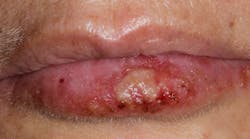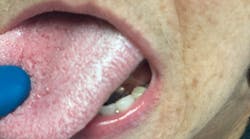Treating cold sores in two days and canker sores through glutathione antioxidation
Introduction
Cold sores and canker sores are common oral health issues that affect 50%–80% of the US population.1 Cold sores, caused by the herpes simplex virus (HSV), manifest as painful blisters on the lips and around the mouth (figure 1). On the other hand, canker sores (or aphthous ulcers) are noncontagious lesions that occur inside the oral cavity and are believed to be caused by various factors, including stress, inflammation, gut dysbiosis, nutritional deficiencies, and immune system dysregulation (figure 2).2
Given the discomfort and potential complications associated with these sores, effective treatment options are continually being explored. One promising candidate is glutathione—a tripeptide composed of glutamine, cysteine, and glycine—known for its potent antioxidative properties. This article explores how glutathione can treat cold sores and canker sores through its antioxidative mechanisms.
Glutathione is a critical antioxidant that protects cells from oxidative stress by neutralizing free radicals and reactive oxygen species (ROS).3 It exists in two forms: reduced glutathione (GSH) and oxidized glutathione disulfide (GSSG). The ratio of GSH to GSSG within cells is often used as a marker for cellular oxidative stress, with a higher ratio indicating a more reduced (and less stressed) cellular environment.4
Oxidative stress is implicated in the pathogenesis of various diseases, including viral infections and inflammatory conditions. The ability of glutathione to modulate oxidative stress makes it a valuable therapeutic agent for conditions characterized by elevated ROS, such as cold sores and canker sores.
Glutathione and cold sores
Cold sores are primarily caused by HSV-1, a virus that induces oxidative stress upon infection and generates ROS, which can damage cellular components and exacerbate the inflammatory response.5 By enhancing the antioxidative capacity of cells, glutathione can mitigate this damage and inhibit viral replication.
A study by Ozbalci et al. (2014) demonstrated that increasing intracellular GSH levels in HSV-1 infected cells reduced the production of viral particles.6 This suggests that glutathione’s antioxidative properties can directly interfere with the viral life cycle, potentially reducing the severity and duration of cold sore outbreaks.
Additionally, glutathione can modulate the immune response, which is crucial for controlling HSV-1 infections. Glutathione has been shown to enhance the function of T-cells and natural killer cells, both of which are essential for mounting an effective antiviral response (Droge, 2002).7 By bolstering the immune system, glutathione may help the body more effectively suppress HSV-1 reactivation and reduce the frequency of cold sore recurrences.
According to coauthor Dr. Nayan Patel, the problem with most glutathione supplements is that the body can’t absorb most glutathione formulations. With a delivery system such as one found in Glutaryl (figure 3), the body can absorb most if not all the glutathione, and you can clear a herpes lesion in as fast as two days.8
Glutathione and canker sores
Canker sores, or aphthous ulcers, are characterized by the presence of painful, recurring lesions within the oral cavity. Although the exact etiology is not well understood, oxidative stress is believed to play a significant role in their development. Factors such as trauma, nutritional deficiencies, irritable bowel disorders, leaky gut, microbiome dysbiosis, and immune dysregulation can all contribute to the generation of ROS, leading to tissue damage and ulcer formation.9
Glutathione’s ability to neutralize ROS and protect against oxidative damage makes it a successful therapeutic option for canker sores. Patients with recurrent aphthous stomatitis (RAS), a condition characterized by frequent canker sores, often have lower levels of antioxidants, including glutathione, in their tissues. Supplementation with glutathione or its precursors can help restore the antioxidative balance and prevent ulcer formation.10
Moreover, glutathione’s anti-inflammatory properties can further aid in the treatment of canker sores. Inflammation is a key component of ulcer pathogenesis, and reducing the inflammatory response can alleviate pain and promote healing. Glutathione has been shown to inhibit the production of pro-inflammatory cytokines, such as TNF-α and IL-6, which are elevated in patients with RAS.11 By dampening the inflammatory response, glutathione can facilitate faster resolution of canker sores.
Potential therapeutic applications
The therapeutic potential of glutathione in treating cold sores and canker sores can be harnessed through various approaches:
- Topical formulations: Developing creams or gels containing glutathione for direct application to cold sores and canker sores could provide localized antioxidative and anti-inflammatory effects. This approach may offer rapid relief and promote healing at the site of the lesion.
- Systemic supplementation: Oral or intravenous supplementation with glutathione or its precursors (such as N-acetylcysteine) can increase systemic GSH levels, enhancing the overall antioxidative capacity of the body. The problem with this is that the body has difficulty absorbing oral glutathione and IV supplementation can be financially prohibitive.12
- Adjunctive therapy: Combining glutathione with existing antiviral or anti-inflammatory treatments could provide synergistic benefits. For example, using glutathione alongside antiviral medications for HSV-1 may improve treatment outcomes by simultaneously targeting the virus and mitigating oxidative stress.
Conclusion
Cold sores and canker sores are prevalent oral health issues that can significantly impact quality of life. The antioxidative and anti-inflammatory properties of glutathione make it a promising therapeutic agent for these conditions. By neutralizing ROS, protecting against oxidative damage, and modulating the immune response, glutathione can potentially reduce the severity and frequency of cold sore and canker sore outbreaks.
Future research should focus on optimizing glutathione delivery methods and exploring its synergistic potential with existing treatments. As our understanding of the role of oxidative stress in these conditions grows, glutathione may become a cornerstone of effective management strategies.
Editor’s note: This article originally appeared in Perio-Implant Advisory, a chairside resource for dentists and hygienists that focuses on periodontal- and implant-related issues. Read more articles and subscribe to the newsletter.
References
- Gopinath D, Koe KH, Maharajan MK, Panda S. A comprehensive overview of epidemiology, pathogenesis and the management of herpes labialis. Viruses. 2023;15(1):225. doi:10.3390/v15010225
- Benahmed AG, Noor S, Menzel A, Gasmi A. Oral aphthous: pathophysiology, clinical aspects and medical treatment. Arch Razi Inst. 2021;76(5):1155-1163. doi:10.22092/ari.2021.356055.1767
- Forman HJ, Zhang H, Rinna A. Glutathione: overview of its protective roles, measurement, and biosynthesis. Mol Aspects Med. 2009;30(1-2):1-12. doi:10.1016/j.mam.2008.08.006
- Franco R, Cidlowski JA. Apoptosis and glutathione: beyond an antioxidant. Cell Death Differ.2009;16(10):1303-1314. doi:10.1038/cdd.2009.107
- Kavouras JH, Prandovszky E, Valyi-Nagy K, et al. Herpes simplex virus type 1 infection induces oxidative stress and the release of bioactive lipid peroxidation by-products in mouse P19N neural cell cultures. J Neurovirol. 2007;13(5):416-425. doi:10.1080/13550280701460573
- Palamara AT, Perno CF, Ciriolo MR, et al. Evidence for antiviral activity of glutathione: in vitro inhibition of herpes simplex virus type 1 replication. Antiviral Res.1995;27(3):237-253. doi:10.1016/0166-3542(95)00008-a
- Dröge W. Free radicals in the physiological control of cell function. Physiol Rev.2002;82(1):47-95. doi:10.1152/physrev.00018.2001
- Patel N, Hyman M. The Glutathione Revolution: Fight Disease, Slow Aging, and Increase Energy with the Master Antioxidant. Hachette Go; 2020.
- Min Z, Yang L, Hu Y, Huang R. Oral microbiota dysbiosis accelerates the development and onset of mucositis and oral ulcers. Front Microbiol. 2023;14:1061032. doi:10.3389/fmicb.2023.1061032
- Zhang Z, Zhang Q, Xue Y, Fang H, Wu Z. Serum levels of reduced glutathione, oxidized glutathione, and glutathione reductase activity in minor recurrent aphthous stomatitis patients. J Dent Sci. 2023;18(3):1103-1108. doi:10.1016/j.jds.2022.11.016
- Pressman AH, Buff S. Glutathione: The Ultimate Antioxidant. Macmillan; 1998.
- Baker S. Nayan Patel, PharmD, founder of Auro Wellness and CEO of Central Drugs Compounding Pharmacy. Integr Med (Encinitas). 2023;22(4):20-23.
About the Author

Scott Froum, DDS
Editorial Director
Scott Froum, DDS, a graduate of the State University of New York, Stony Brook School of Dental Medicine, is a periodontist in private practice at 1110 2nd Avenue, Suite 305, New York City, New York. He is the editorial director of Perio-Implant Advisory and serves on the editorial advisory board of Dental Economics. Dr. Froum, a diplomate of both the American Academy of Periodontology and the American Academy of Osseointegration, is a volunteer professor in the postgraduate periodontal program at SUNY Stony Brook School of Dental Medicine. He is a PhD candidate in the field of functional and integrative nutrition. Contact him through his website at drscottfroum.com or (212) 751-8530.

Nayan Patel, PharmD
Nayan Patel, PharmD, is a sought-after pharmacist, wellness expert, and thought leader in the antiaging industry. He has worked with physicians since 1999 to develop custom medications and design patient-specific drug and nutrition regimens. He recently published The Glutathione Revolution: Fight Disease, Slow Aging, and Increase Energy with the Master Antioxidant. He has spent more than a decade researching glutathione and is globally regarded as the foremost expert on its absorbable forms. He holds the only patent on transdermal glutathione. Along with educating practitioners around the world on advanced biochemistry and anti-aging science, Dr. Patel also serves as adjunct faculty at the University of Southern California School of Pharmacy, where he is also an alumnus.







